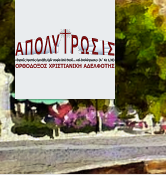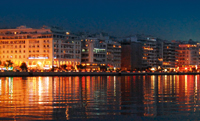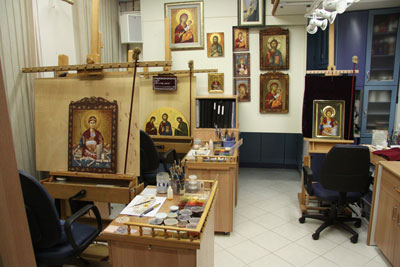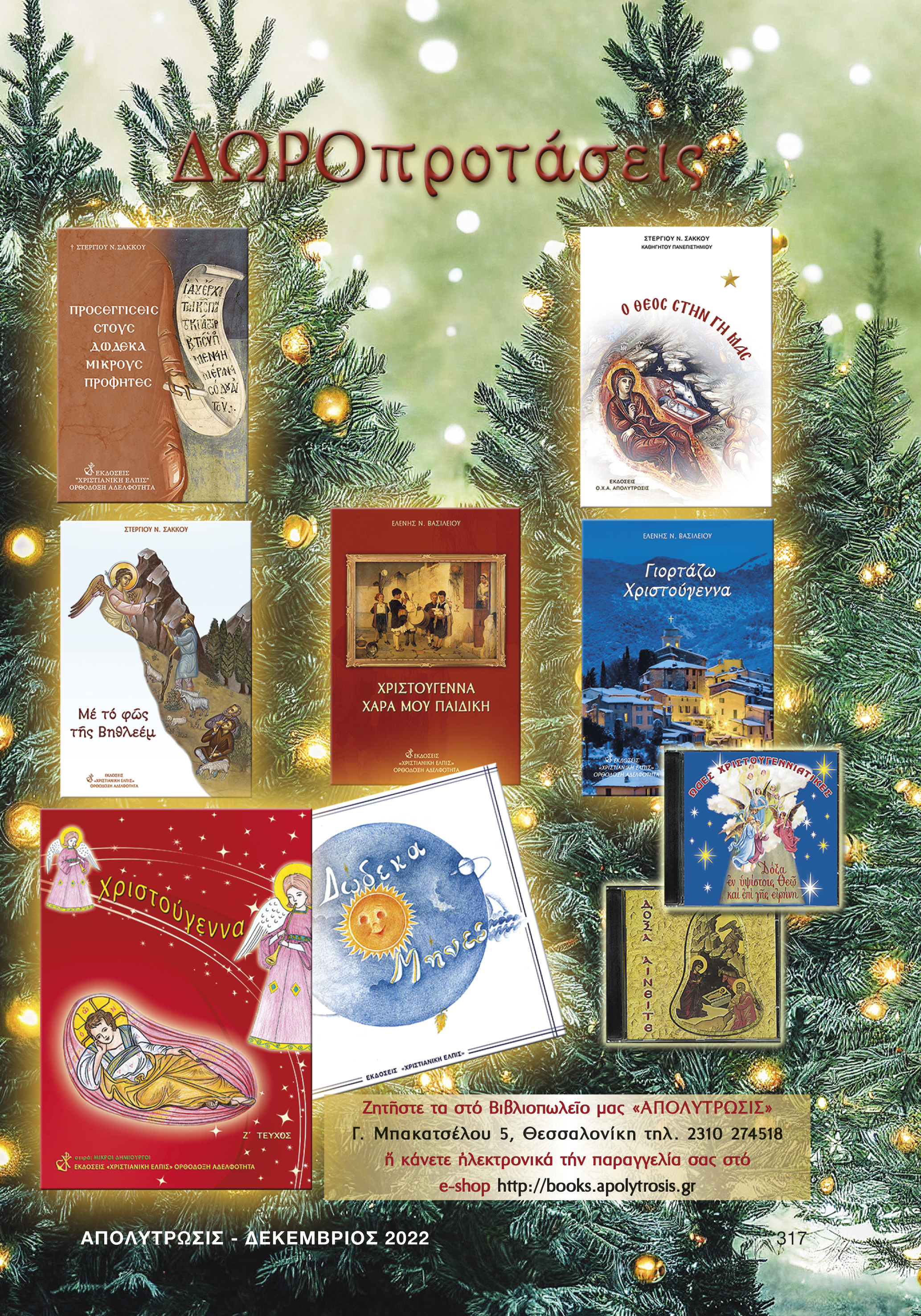Translation from the Book
Ὁ Θεός στήν ἱστορία τῆς Ἐκκλησίας, Βοήθημα Κατωτέρου Κατηχητικοῦ Γ΄,
ἐκδ. «Χριστιανική Ἐλπίς» Ὀρθόδοξη Ἀδελφότητα, Θεσσαλονίκη 2016, σσ. 72-77
(An opportunity for this lesson could be the preparation for the Christmas celebration).
Children, who were the first to hear about the birth of Christ? Yes, the simple and humble shepherds of Bethlehem. Today, we'll be talking about one such shepherd. He wasn't among those who saw the newborn Christ. He lived three centuries after Christ’s birth. With strong faith and a pure heart, he became a saint of our Church. His name was Spyridonas. We honor his memory every year on December 12th.
In the late 3rd century AD (around 270 AD), Spyridonas was born in Cyprus. His parents were shepherds who, despite being poor in wealth, were rich in faith and virtue. The latter gave to their son. Spyridonas did not receive proper education, but from a young age, he learned to believe in God and to love people. He was happy to help, serve and host others in his house. He also took joy in tending to his sheep with a simple and humble heart. His faith and virtue made him well-known not only in his hometown but also in the surrounding villages. People considered him as an example of a saint.
When the bishop of his hometown Trimythountas, passed away, all eyes turned to Spyridonas. His wife had already passed away (back in those days even married Christians could be bishops) and everyone was demanding for him to become their Bishop. But how could he, a humble shepherd turn into a Bishop? Despite his initial hesitation, he accepted to be a bishop only when he was convinced that it was not his fellow citizens but Christ Himself calling him to leave his sheep and become a shepherd of the Church’s flock.
So, Spyridonas, once a shepherd, became the Bishop of Trimythountas, his birthplace, in Cyprus. As a caring father, he tirelessly looked after all the faithful. God quickly allowed the greatness of his holiness to be revealed:
One day, during the Divine Liturgy, the faithful witnessed angels surrounding the Holy Altar and participating in the service alongside Saint Spyridonas! When the saint stepped out to the Royal Doors and said, “Peace to all,” the angels responded with the words the chanters say, “And with your spirit”!
Once, a poor man who had a big family, approached him in tears, seeking money to pay off a large debt. The lender had threatened to take away their house, leaving the children on the streets. Saint Spyridonas wondered where could he find such a large sum? Suddenly, right next to him, he noticed a snake crawling through the grass. As a thought crossed his mind about Aaron's rod, which turned into a serpent when thrown on the ground in Pharaoh's palace, he ardently prayed and raised his hand, “Oh Lord, let this snake turn into gold for this poor man!”. The snake stopped and Saint Spyridonas picked it up. In his hand, the reptile transformed into pure gold! Overjoyed, the poor man took the gold and hurried to repay his debt.
On another occasion, a woman came weeping to Saint Spyridonas, asking for a piece of jewellery she had given to his daughter to keep it safe. However, the daughter had passed away, and no one knew where the precious item was. The saint went to the daughter’s grave, prayed earnestly to God and then spoke to her as if she were alive: “Where did you put, my daughter, the woman’s jewellery?” From the grave, she responded and revealed the exact location where she had stored it!
Saint Spyridonas not only proved to be a miracle-worker but also a fighter of faith and a great theologian, despite he was a former shepherd.
In 325 AD, the Emperor Constantine called bishops from all regions of the great empire to gather in Nicaea, a city near Constantinople. This gathering, known as the First Ecumenical Council, brought together 318 Fathers of our Church, including Saint Spyridonas, to confront a major heretic, Arius. A heretic is someone who distorts and alters the truths of our faith. Arius, a presbyter and theologian, supported dangerous blasphemies, claiming that Christ is not God and that God is not Triune.
So, a serious debate arose between the holy Fathers and Arius. The most educated bishops engaged in a real battle, vigorously defending the truth. Saint Athanasius, who was still a young deacon at the time, passionately defended the truth with compelling arguments. In the end, Saint Spyridonas rose to speak, surprising everyone. Could this humble bishop take on the educated Arius?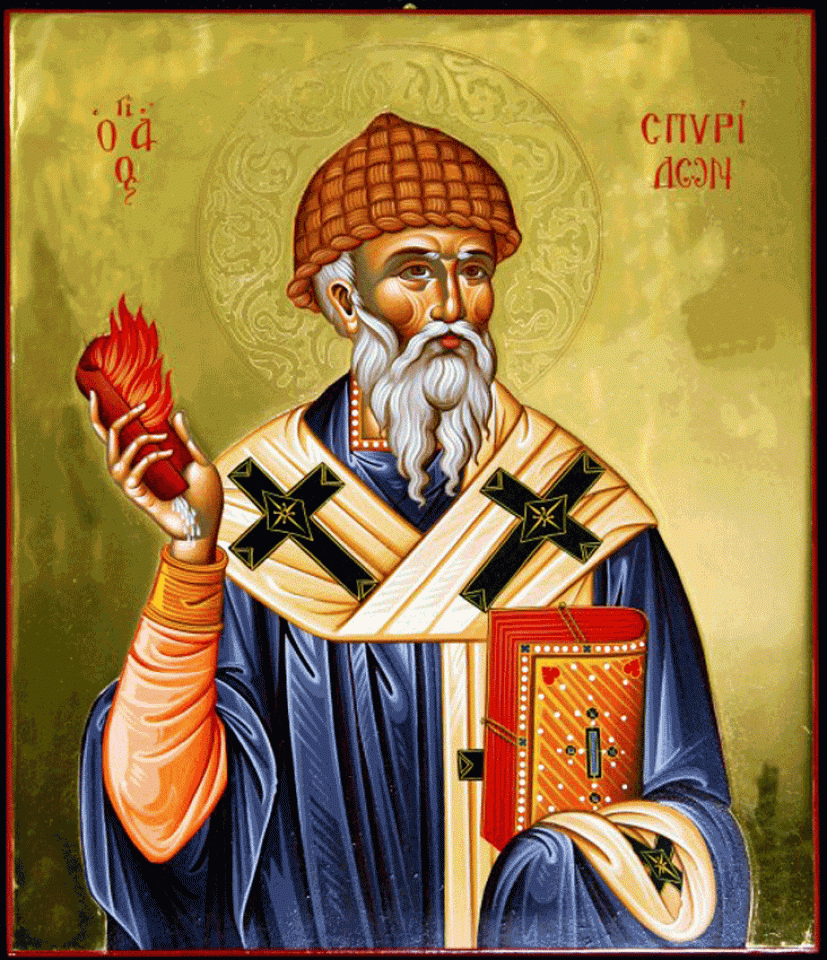 Holding a brick in his hands, Saint Spyridonas said to Arius, “Do you see this? It is one, but also three things together.” Then, he performed the sign of the Cross, saying loudly, “In the name of the Father and of the Son and of the Holy Spirit.” A miracle occurred: the brick split into three elements from which it was made. When the saint uttered “In the name of the Father,” everyone witnessed a flame rising to the sky. It was the fire used to bake the clay into the brick. He continued, “and of the Son,” and water poured from the brick. It was the water mixed with the clay to form the brick. Finally, he said, “and of the Holy Spirit,” and opening his hand, he showed the clay that had been used to make the brick. If a simple object, a brick, is made up of three materials that become one, what prevents God from being Triune, that is, three persons - Father, Son, and Holy Spirit - yet one God?
Holding a brick in his hands, Saint Spyridonas said to Arius, “Do you see this? It is one, but also three things together.” Then, he performed the sign of the Cross, saying loudly, “In the name of the Father and of the Son and of the Holy Spirit.” A miracle occurred: the brick split into three elements from which it was made. When the saint uttered “In the name of the Father,” everyone witnessed a flame rising to the sky. It was the fire used to bake the clay into the brick. He continued, “and of the Son,” and water poured from the brick. It was the water mixed with the clay to form the brick. Finally, he said, “and of the Holy Spirit,” and opening his hand, he showed the clay that had been used to make the brick. If a simple object, a brick, is made up of three materials that become one, what prevents God from being Triune, that is, three persons - Father, Son, and Holy Spirit - yet one God?
The miracle of the saint embarrassed Arius and his followers. The holy Fathers glorified God, who through this miraculous way, illuminated the truth.
The Trinitarian Doctrine
Children, this truth is the primary doctrine of our faith. Doctrines are the big truths in our faith that we can’t fully grasp with our minds, but we accept them as Christ revealed and the Holy Fathers of our Church taught us.
It’s crucial to know these doctrines and distinguish them from the errors of heretics because these truths guide us to salvation, into God’s embrace. Imagine following signs to reach your destination and ending up at a cliff because some people have changed them and don’t show the right way! Or consider taking medicine to get better, only to find out it’s been tampered with; it will surely harm us even more. It’s that bad when our faith truths are distorted. It’s essential to keep them unchanged, exactly as the Holy Fathers handed them down to us.
As mentioned earlier, the most significant doctrine of our faith is that God is Triune. Meaning, God is three persons—the Father, the Son, and the Holy Spirit—but only one God.
Unfortunately, even today, there are many heretics. The Witnesses of Jehovah, also known as Millennialists, support the error of Arianism. It’s tragic! They hold the Bible in their hands but reject the Holy Trinity. Yet, if you open the New Testament in Matthew, the last chapter, verse 19, Christ clearly instructs His disciples to baptize people “in the name of the Father and of the Son and of the Holy Spirit.”
Orthodox Christians confess their faith in the Holy Trinity every time they recite the Creed. Pay attention to what we're saying, “I believe in one God, the Father Almighty... And in one Lord Jesus Christ, the only begotten Son of God... And in the Holy Spirit, the Lord, the Giver of Life...”.
We also confess our faith every time we make the sign of the cross correctly. We join our three fingers to show precisely that God is three persons—Father, Son, and Holy Spirit—but one God.
Can you think of any prayers of our Church that reveal the Trinitarian doctrine? Here are a few examples:
• “In the name of the Father and of the Son and of the Holy Spirit”: One name because there is one God but three persons—Father, Son, and Holy Spirit.
• “Glory to the Father and to the Son and to the Holy Spirit”.
• “Holy God, Holy Mighty, Holy Immortal, have mercy on us”: We say “holy” three times because the one holy God is three persons.
Today, we will learn another short prayer, a hymn in which we ask for the mercy of the Triune God for the whole world:
“O Triune God, Father, Son, and Spirit, have mercy on the world”.
Note: At the end of the lesson, we could share the troparion of Saint Spyridon with the children and ask them to point out references to his miracles. The relics of Saint Spyridon are preserved intact in Corfu up to this day and continue to work miracles.
Copyright © 2021 by Orthodox Christian Association «ΧΡΙΣΤΙΑΝΙΚΗ ΕΛΠΙΣ» ΟΡΘΟΔΟΞΗ ΑΔΕΛΦΟΤΗΤΑ. All rights reserved.

